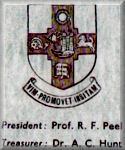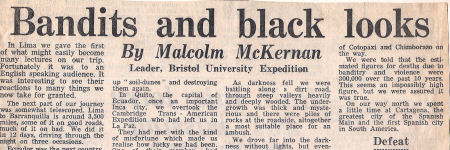University
of Bristol Trans-Continental Expedition 1960 — 61 | ||||||||
| ||||||||
| Published 4 August 1961 | ||||||||
Editorial note This report may seem short considering the distance of 3,750 kms we covered from Lima in Peru to Barranquilla on the Atlantic coast of Colombia but we were hurrying. We had arranged to catch a ship due to take us from South America to somewhere, still undecided in Central America. Malcolm had very little spare time to write more than this brief account for the Expedition record. Many of the places along the route are worthy of days of attention - even years - but we had to drive day and night. | ||||||||
In Lima we gave the first of what might easily become many lectures on our trip. Fortunately it was to an English speaking audience. It was interesting to see their reactions to many things we now take for granted. The next part of our journey was somewhat telescoped. Lima to Barranquilla is around 3,500 miles, some of it on good roads, much of it on bad. We did it in 12 days, driving through the night on three occasions. Ecuador Ecuador was the next country on the coast, a land of plantations, of bananas, coffee and cocoa. We were interested to see cocoa growing for the first time. It is surprising to find such small beans coming out of such large pods. Desert Later in the hills, a further surprise greeted us. The land was laid out in fields - English style - and was intensively worked. The rolling fields, hills and woods were very peaceful, and, perhaps for the first time, we were slightly homesick. Higher still the surroundings were less happy. Close cropping by sheep and lack of forest conservation had caused impoverishing of the land. Whole areas were of desert; nothing could grow in the shifting soil, and great clouds of black dust - finer than sand - swirled across the land, building up "soil dunes" and destroying them again. In Quito, the capital of Ecuador, once an important Inca city, we overtook the Cambridge Trans-American expedition who had left us in La Paz. They had met with the kind of misfortune which made us realise how lucky we had been. One of their members had caught jaundice and had to be flown home to England. Just north of Quito we crossed the equator for the first time on land, and this naturally gave great opportunity for photography. Colombia was ahead of us and Colombia was dangerous. Bandits swarmed behind every bush, we were told. Only ten days before a busload of twenty-eight people had been hacked to death with machetes! Pistol We had not been carrying firearms, but, on this occasion, borrowed a .22 pistol from the Cambridge boy who was returning to England. Armed with this mighty piece of artillery we set off to fight our way through. The first night we slept in a Customs House, it being too late to complete formalities anyway. The second was more tricky. As darkness fell we were battling along a dirt road, through steep valleys heavily and deeply wooded. The undergrowth was thick and mysterious and there were piles of rocks at the roadside, altogether a most suitable place for an ambush. We drove far into the darkness without lights, but eventually safety considerations compelled us to use them and thus to disclose our position. Many of the local inhabitants carried guns, and all carried machetes. They were an unfriendly crowd! Bogota At last we were stopped, but of all things for a Customs check. We were glad to see a rest house. Four of us slept there and two in the cars to protect our belongings, our usual system on these occasions. The uneasiness we felt disinclined us to wait so we drove straight through the next 36 hours to Bogota, the capital, peering suspiciously in the night as we travelled. Bogota is a modern city and expensive. There was a three day religious holiday while we were there, so we stayed just one night there before pushing off towards Barranquilla. We were told that the estimated figures for deaths due to banditry and violence were 300,000 over the past 10 years. This seems an impossibly high figure, but we were assured it was true. On our way north we spent a little time at Cartagena, the greatest city of the Spanish Main and the first Spanish city in South America. Defeat We inspected the fort which the British Admiral Vernon had failed to take in 1741 even though his men outnumbered the defendants by ten to one. The low five foot six passages of this fort are fascinating. Sixty feet below the ground and built of stone, they provided sleeping accommodation in small alcoves for the garrison of 400 men. Other underground passages connect with different parts of the city, and there is a virtually perfect system of ventilation by hot and cold air-shafts. The construction incorporates slight angles which amplify sounds, the slightest whisper can be heard 60 yards away. At
Barranquilla we had a piece of good fortune; an air-freight company offered to
fly us across to Miami at reduced rates. But it had to be immediately; so it was
a case of "hello, goodbye", pack up and let's go. But we got to America.
18 August 1961
|


 Lima,
First stop on the homeward journey
Lima,
First stop on the homeward journey